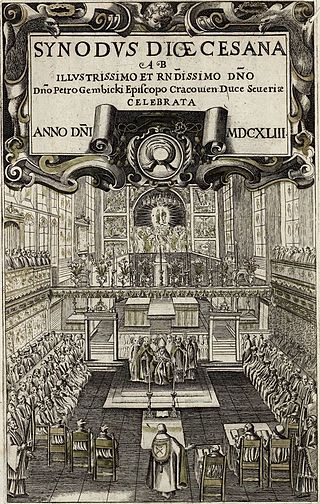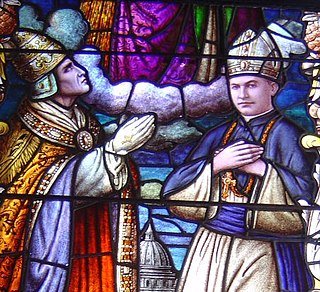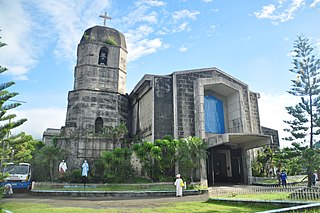
In church governance, a diocese or bishopric is the ecclesiastical district under the jurisdiction of a bishop.

A synod is a council of a Christian denomination, usually convened to decide an issue of doctrine, administration or application. The word synod comes from the Ancient Greek σύνοδος 'assembly, meeting'; the term is analogous with the Latin word concilium'council'. Originally, synods were meetings of bishops, and the word is still used in that sense in Catholicism, Oriental Orthodoxy and Eastern Orthodoxy. In modern usage, the word often refers to the governing body of a particular church, whether its members are meeting or not. It is also sometimes used to refer to a church that is governed by a synod.
An ecclesiastical court, also called court Christian or court spiritual, is any of certain courts having jurisdiction mainly in spiritual or religious matters. In the Middle Ages, these courts had much wider powers in many areas of Europe than before the development of nation states. They were experts in interpreting canon law, a basis of which was the Corpus Juris Civilis of Justinian, which is considered the source of the civil law legal tradition.
A pastoral council is a consultative body in dioceses and parishes of the Catholic Church that serves to advise the parish priest or bishop about pastoral issues. The council's main purpose is to investigate, reflect and reach conclusions about pastoral matters to recommend to the parish priest or bishop as appropriate.
A suffragan bishop is a type of bishop in some Christian denominations.
Defrocking, unfrocking, degradation, or laicization of clergy is the removal of their rights to exercise the functions of the ordained ministry. It may be grounded on criminal convictions, disciplinary problems, or disagreements over doctrine or dogma, but may also be done at their request for personal reasons, such as running for civil office, taking over a family business, declining health or old age, desire to marry against the rules for clergy in a particular church, or an unresolved dispute. The form of the procedure varies according to the Christian denomination concerned.

In Christian churches with episcopal polity, the rank of metropolitan bishop, or simply metropolitan, pertains to the diocesan bishop or archbishop of a metropolis.

The Polish National Catholic Church is an independent Old Catholic church based in the United States and founded by Polish-Americans.

In several of the autocephalous Eastern Orthodox churches and Eastern Catholic Churches, the patriarch or head bishop is elected by a group of bishops called the Holy Synod. For instance, the Holy Synod is a ruling body of the Georgian Orthodox Church.

An ordinary is an officer of a church or civic authority who by reason of office has ordinary power to execute laws.
A coadjutor bishop is a bishop in the Catholic, Anglican, and (historically) Eastern Orthodox churches whose main role is to assist the diocesan bishop in the administration of the diocese. The coadjutor is a bishop himself, although he is also appointed as vicar general. The coadjutor bishop is, however, given authority beyond that ordinarily given to the vicar general, making him co-head of the diocese in all but ceremonial precedence. In modern times, the coadjutor automatically succeeds the diocesan bishop upon the latter's retirement, removal, or death.
The hierarchy of the Catholic Church consists of its bishops, priests, and deacons. In the ecclesiological sense of the term, "hierarchy" strictly means the "holy ordering" of the church, the Body of Christ, so to respect the diversity of gifts and ministries necessary for genuine unity.
A curia is an official body that governs an entity within the Catholic Church. These curias range from the relatively simple diocesan curia; to the larger patriarchal curias; to the curia of various Catholic particular churches; to the Roman Curia, which is the central government of the Catholic Church. Other Catholic bodies, such as religious institutes, may also have curias.

In the Catholic Church, a bishop is an ordained minister who holds the fullness of the sacrament of holy orders and is responsible for teaching doctrine, governing Catholics in his jurisdiction, sanctifying the world and representing the Church. Catholics trace the origins of the office of bishop to the apostles, who it is believed were endowed with a special charism and office by the Holy Spirit at Pentecost. Catholics believe this special charism and office has been transmitted through an unbroken succession of bishops by the laying on of hands in the sacrament of holy orders.
The appointment of bishops in the Catholic Church is a complicated process. Outgoing bishops, neighbouring bishops, the faithful, the apostolic nuncio, various members of the Roman Curia, and the pope all have a role in the selection. The exact process varies based upon a number of factors, including whether the bishop is from the Latin Church or one of the Eastern Catholic Churches, the geographic location of the diocese, what office the candidate is being chosen to fill, and whether the candidate has previously been ordained to the episcopate.

The Roman Catholic Diocese of Virac is a diocese of the Latin Church of the Roman Catholic Church in the Philippines. The Diocese of Virac, Catanduanes was established in 1974, from territory in the Diocese of Legazpi and the diocese is a suffragan of the Archdiocese of Caceres.

The Diocese of Quincy was a diocese of the Episcopal Church in western Illinois from 1877 to 2013. The cathedral seat was originally in Quincy, Illinois but was moved to St. Paul's Cathedral in Peoria in 1963. In order to avoid confusion with the Roman Catholic Diocese of Peoria, the diocese retained the name of the location of its original "home" city, Quincy, where its cathedral seat was St. John's.
The canonical situation of the Society of Saint Pius X (SSPX), a group founded in 1970 by Archbishop Marcel Lefebvre, is unresolved. The Society of Saint Pius X has been the subject of much controversy since 1988, when Bernard Fellay, Bernard Tissier de Mallerais, Richard Williamson and Alfonso de Galarreta were illicitly consecrated at Ecône, at the International Seminary of Saint Pius X as bishops in violation of canon law. Lefebvre and the four other SSPX bishops individually incurred a disciplinary latae sententiae excommunication for the schismatic act; the excommunications of the four living SSPX bishops were remitted in 2009.
In the Catholic Church, the Synod of Bishops, considered as an advisory body for the pope, is one of the ways in which the bishops render cooperative assistance to him in exercising his office. It is described in the 1983 Code of Canon Law as "a group of bishops who have been chosen from different regions of the world and meet at fixed times to foster closer unity between the Roman Pontiff and bishops, to assist the Roman Pontiff with their counsel in the preservation and growth of faith and morals and in the observance and strengthening of ecclesiastical discipline, and to consider questions pertaining to the activity of the Church in the world."
A decree is, in a general sense, an order or law made by a superior authority for the direction of others. In the usage of the canon law of the Catholic Church, it has various meanings. Any papal bull, brief, or motu proprio is a decree inasmuch as these documents are legislative acts of the pope. In this sense the term is quite ancient. The Roman congregations were formerly empowered to issue decrees in matters which come under their particular jurisdiction, but were forbidden from continuing to do so under Pope Benedict XV in 1917. Each ecclesiastical province, and also each diocese may issue decrees in their periodical synods within their sphere of authority.









